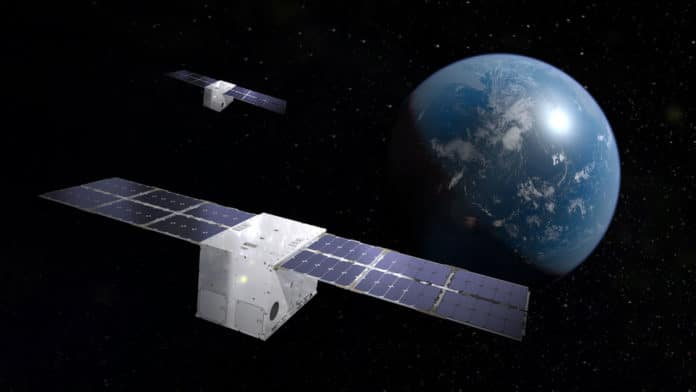Lockheed Martin’s In-space Upgrade Satellite System (LINUSS) is a new CubeSat family designed to demonstrate how small CubeSats can regularly upgrade existing satellite constellations in orbit to add timely new capabilities and extend spacecraft design lives. It has finished environmental testing and is ready for launch later this year.
LINUSS consists of a pair of 12U CubeSats, each the size of a four-slice toaster, based on the Lockheed Martin LM 50 nanosatellite bus design. The LINUSS CubeSats were developed in collaboration with Tyvak Nano-Satellite Systems, with Lockheed providing the electro-optical payload decks. Solar panels produce up to 250 W of power for the craft, which will have a mission life of up to five years.
The CubeSats are designed to demonstrate how small satellites can serve an essential role in sustaining critical space architectures in any orbit. Developed using internal funding, LINUSS will be placed in Geosynchronous Earth Orbit (GEO) at an altitude of about 22,236 miles (35,786 km). Its mission is to validate essential maneuvering capabilities for Lockheed Martin‘s future space upgrade and servicing missions. It will also showcase miniaturized Space Domain Awareness capabilities, or the ability to detect, track, identify and characterize artificial objects, i.e., active/inactive satellites, spent rocket bodies, or fragmentation debris.
LINUSS also will demonstrate mature new onboard high-performance data processing by Innoflight; low-toxicity propulsion by VACCO; and inertial measurement units, machine vision, 3-D printed components, and SmartSat (transformational on-orbit software upgrade architecture) technologies by Lockheed Martin. The ultimate near-term goal is to certify the technology to support upgradeable LM 2100 satellite bus platforms, starting with GPS IIIF Space Vehicle 13.
“Given we are well known for our systems integration work on large satellite systems, some people are surprised to learn Lockheed Martin has launched over 150 small satellites since 1997,” said Dr. David J. Barnhart, LINUSS Program Director. “LINUSS has higher bus density, payload accommodation, and on-orbit processing than any other CubeSat, enabling revolutionary mission capabilities in the future. Early customer community feedback has called LINUSS ‘the most capable CubeSat pair off the planet.’“
